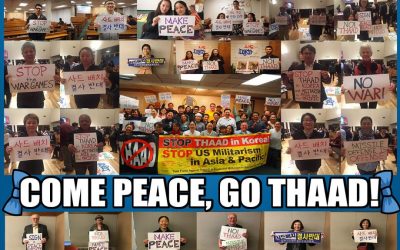US and South Korea Defense Chiefs Agree to Keep US Troops in Korea After OPCON Transfer

At their annual Security Consultative Meeting, held in Washington DC on October 31, the South Korean and US defense chiefs signed the “Guiding Principles Following the Transition of Wartime Operational Control,” which says US Forces in Korea and the Combined Forces Command will remain in South Korea even after the transfer of wartime operational control (OPCON) to South Korea.
South Korean Defense Minister Jeong Kyeong-doo and US Defense Secretary James Mattis agreed,
“the contributions of the ROK – U.S. Alliance are to continue into the future, carrying on the spirit of the ROK- U.S. Mutual Defense Treaty to prevent armed conflict on the Korean Peninsula, promote peace and stability in Northeast Asia, and contribute to global peace.”
According to the agreement, after OPCON transfer, South Korea will appoint a General or an Admiral to serve as the Commander of the Combined Forces Command (CFC), and the United States will appoint a General or an Admiral to serve as its deputy commander. Currently, a U.S. general serves as the commander of the CFC and a South Korean general serves as its deputy commander.
OPCON transfer is expected to be completed before the end of President Moon Jae-in’s term in office.
The full text of the “Guiding Principles Following the Transition of Wartime Operational Control” can be here.
The full text of the Joint Communiqué of the 50th U.S.-ROK Security Consultative Meeting can be read here.
South Korean defense minister says THAAD deployment will be permanent
South Korean Defense Minister Jeong Kyeong-doo announced the country will formalize the deployment of the controversial U.S. Terminal High Altitude Area Defense (THAAD) missile system once the necessary Environmental Impact Assessment is completed. The Peace Committee to Stop THAAD Deployment denounced the Moon Jae-in administration for “ignoring law and order to bring in strategic weapons for the U.S. missile defense system, which has no place in the vision for peace on the Korean Peninsula.”
*
Note to readers: please click the share buttons above. Forward this article to your email lists. Crosspost on your blog site, internet forums. etc.

